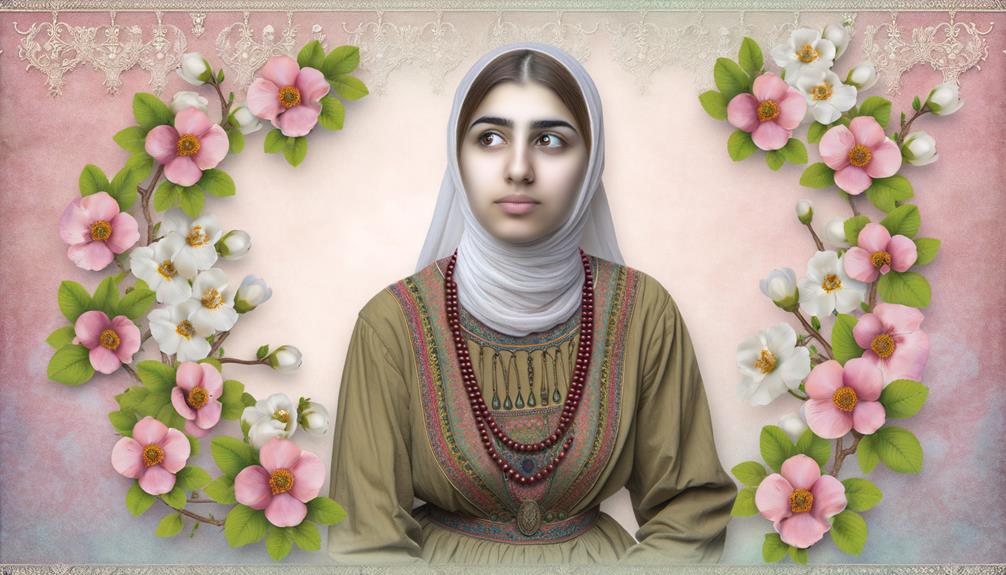Meaning of Mary Jane Name
The name Mary Jane combines Hebrew and Old French origins. 'Mary' comes from Miriam, an ancient Hebrew name prevalent in religious texts, often associated with the Virgin Mary, symbolizing purity.
'Jane' derives from the Old French Jehanne, meaning 'God is gracious,' sharing roots with the name John, linked to John the Baptist. Since the 18th century, this name has held significant cultural and literary importance, including notable appearances in literature and modern pop culture.
It straddles traditional and contemporary uses, offering a rich historical tapestry well worth exploring further.

Key Takeaways
- 'Mary' originates from the Hebrew name Miriam, symbolizing purity and faith.
- 'Jane' derives from the Hebrew Yochanan, meaning 'God is gracious'.
- Mary Jane combines divine grace and sacred motherhood themes.
- The name reflects historical, religious, and cultural significance.
- Modern usage includes associations with simplicity, wholesomeness, and cannabis.
Historical Origins
The historical origins of the name Mary Jane can be traced back to the combination of two timeless and culturally significant names, 'Mary' and 'Jane,' each carrying its own rich historical and etymological heritage.
'Mary' is derived from the Hebrew name Miriam, which has been a prevalent choice across various cultures for centuries. Its usage surged in the Christian world due to its association with the Virgin Mary.
Conversely, 'Jane' stems from the Old French name Jehanne, a feminine form of John, meaning 'God is gracious.' Together, Mary and Jane have been popular in English-speaking countries since the 18th century, embodying a blend of religious reverence and grace.
This duality enriches the name with layered historical significance.
Biblical References
Building on its historical origins, the name Mary Jane also possesses significant biblical references that further underscore its profound cultural and religious resonance.
The name 'Mary' is deeply rooted in Christian tradition, primarily associated with the Virgin Mary, the mother of Jesus Christ, symbolizing purity, faith, and maternal love.
The name 'Jane' is derived from the Hebrew name Yochanan, meaning 'God is gracious.' Though less directly linked to specific biblical figures, Jane shares the same foundational etymology as John the Baptist, a pivotal figure in the New Scripture.
Together, Mary Jane amalgamates two names that resonate with themes of divine grace and sacred motherhood, providing a rich, layered significance that transcends mere nomenclature.
Cultural Impact
The name Mary Jane has had a significant cultural impact, particularly through its association with the iconic comic book character Mary Jane Watson from the Spider-Man series. This character has not only influenced popular media but has also become a symbol of enduring love and resilience.
Additionally, the name has permeated various facets of pop culture, from music to fashion, further cementing its place in contemporary society.
Comic Book Icon
As an integral character in the Spider-Man series, Mary Jane Watson has greatly influenced the cultural landscape of comic books, evolving from a mere love interest to a symbol of resilience and complexity.
Introduced in 1966 by Stan Lee and John Romita Sr., Mary Jane quickly became a pivotal figure in Peter Parker's life, embodying the everywoman who faces life's challenges with determination.
Her character development reflects broader societal shifts, portraying a woman who balances her career ambitions with personal relationships. Over decades, Mary Jane's evolution mirrors changing gender norms and the increasing demand for multidimensional female characters in media.
This progression underscores her lasting impact on comic book narratives and character archetypes, solidifying her status as a comic book icon.
Pop Culture References
Throughout the decades, Mary Jane Watson has transcended her origins in comic books to become a pervasive element in popular culture, influencing various media and artistic expressions. Her character, originally introduced as Peter Parker's love interest in 'The Amazing Spider-Man,' has been adapted into numerous forms, impacting generations of fans.
- Film and Television: Mary Jane has been featured in multiple Spider-Man film adaptations, prominently portrayed by Kirsten Dunst and Zendaya, bringing her character to a broader audience.
- Merchandise: Her image has been immortalized in action figures, clothing, and other consumer goods, making her a recognizable figure beyond comic book enthusiasts.
- Music: Songs and lyrics have referenced Mary Jane, indicating her cultural resonance and symbolic representation in popular music.
Etymology of Mary
The name Mary finds its origins in the Hebrew name Miriam, which can be traced back to the Old Scriptures. Historically, the name holds significant biblical importance, having been borne by Mary, the mother of Jesus, thereby cementing its prominence in Christian traditions.
Such historical and religious associations have contributed to its enduring popularity across centuries.
Origins in Hebrew
Rooted in ancient Hebrew, the name ‘Mary’ originates from the name ‘Miriam,’ which carries significant historical and cultural connotations. The etymology of ‘Miriam’ is complex, with scholars proposing various meanings. One theory suggests it derives from the Egyptian word ‘mry,’ meaning ‘beloved. ‘ Another interpretation links it to the Hebrew term ‘marah,’ translating to ‘bitterness’ or ‘rebellion,’ reflecting the Israelites’ struggles. Furthermore, the name Mary has transcended its origins, becoming emblematic in various cultures and religions, particularly in Christianity, where it is synonymous with virtues of compassion and motherhood. In parallel, exploring the meaning behind the name Diane reveals another layer of cultural significance, as it is often associated with divine qualities and the Roman goddess of the hunt, Diana. Both names, steeped in history and significance, highlight the timeless nature of personal identity linked to linguistic roots.
Linguistic Evolution: The name evolved through different languages, becoming 'Maria' in Latin.
Historical Figures: Miriam appears in ancient texts, influencing the spread of the name.
Cultural Impact: The name has been widely adopted across cultures, maintaining its historical roots.
This layered etymology underscores 'Mary's' rich heritage.
Biblical Significance
In biblical texts, the name 'Mary' holds profound significance, often symbolizing purity and devotion, and is prominently associated with key religious figures such as the Virgin Mary and Mary Magdalene.
The etymology of Mary traces back to the Hebrew name Miriam, which is believed to mean 'beloved' or 'bitter.'
The Virgin Mary, mother of Jesus Christ, epitomizes purity and maternal devotion, playing a central role in Christian theology. Meanwhile, Mary Magdalene represents repentance and unwavering faith, being one of Jesus' most loyal followers.
These associations have cemented the name's spiritual resonance, making it a symbol of steadfast faith and virtue throughout centuries of religious tradition. Such profound historical and religious contexts contribute to the enduring popularity of the name Mary.
Etymology of Jane
Etymologically, the name Jane derives from the Hebrew name Yochanan, which means 'Yahweh is gracious.' This name underwent several transformations across different cultures and languages before reaching its current form.
In Latin, it became Ioannes, and from there, it evolved into the Old French Jehanne. By the Middle Ages, Jane had firmly established itself in English-speaking regions.
Notable points of interest include:
- Historical Usage: Jane was a favored name among English royalty and nobility.
- Literary Presence: It has been immortalized in classic literature, such as Charlotte Brontë's 'Jane Eyre.'
- Cultural Impact: The name has maintained a consistent presence in Western culture, often symbolizing simplicity and elegance.
These elements collectively shape the rich etymological history of the name Jane.
Popularity Over Time
The popularity of the name Mary Jane has fluctuated greatly throughout history, reflecting broader social, cultural, and linguistic trends. Initially gaining prominence in the 19th century, the name experienced several peaks and troughs. Its appeal was particularly strong during periods of traditional naming conventions, while it waned during eras favoring more modern or unique names. The following table illustrates this trend over the past century:
| Decade | Popularity Rank | Notable Influences |
|---|---|---|
| 1920s | High | Victorian influence |
| 1950s | Moderate | Post-war traditionalism |
| 1980s | Low | Rise of unique, individual names |
| 2000s | Moderate | Nostalgic revival of classic names |
This cyclic pattern underscores the influence of shifting cultural dynamics on naming practices.
Literary Significance
Exploring the literary significance of the name Mary Jane reveals its deep roots in classic literature and its enduring presence in modern storytelling.
The name Mary Jane has been a fixture in various literary works, symbolizing diverse character archetypes and cultural themes.
- Classic Literature: Mary Jane appears in Charles Dickens' 'Bleak House,' embodying innocence and virtue.
- Children's Literature: The name is frequently used in children's books, often representing relatable, everyday characters.
- Comic Books: In the Marvel Universe, Mary Jane Watson is a central figure in Spider-Man lore, showcasing strength and resilience.
These instances illustrate how the name Mary Jane has been woven into narratives that reflect broader societal values and individual identities, enriching the literary tapestry through time.
Modern Associations
Building on its rich literary heritage, the name Mary Jane has evolved in modern times to encompass a variety of associations that extend beyond the realm of fiction.
Historically, Mary Jane has been a symbol of simplicity and wholesomeness, epitomized by the iconic Mary Jane shoes popularized in the early 20th century.
In contemporary culture, the name has also become synonymous with cannabis, owing to the slang term 'Mary Jane' for marijuana. This duality of meanings reflects the name's complex evolution, as it straddles both traditional and countercultural spheres.
The modern interpretation of Mary Jane is therefore multifaceted, embodying a blend of historical significance and contemporary relevance, making it a unique identifier in today's society.
Naming Trends
In examining naming trends, Mary Jane demonstrates a fascinating trajectory that mirrors broader societal shifts and cultural transformations over the decades.
Initially popular in the 19th century, the name saw a resurgence in the mid-20th century, reflecting a period of nostalgia and traditional values. This dual-name combination also illustrates the trend of using compound names, a practice rooted in European traditions.
Several factors have influenced the popularity of Mary Jane:
- Literary and Pop Culture References: Characters in novels and films often revive interest in traditional names.
- Religious Connotations: The name Mary, in particular, retains strong Christian associations.
- Shifts in Naming Conventions: Periods of conservatism often see a return to classic names like Mary Jane.
Understanding these trends provides insight into the evolving cultural landscape.
Conclusion
The name Mary Jane, steeped in rich historical origins and biblical references, has traversed centuries, evolving in cultural significance and literary prominence.
Its etymological roots in Mary and Jane expose profound, multifaceted meanings. Popularity trends and modern associations further underscore its enduring appeal.
The question remains: will Mary Jane continue to captivate and resonate within contemporary society, or will it fade into obscurity? Only time will reveal the fate of this storied and iconic name.






